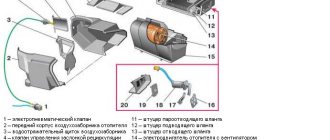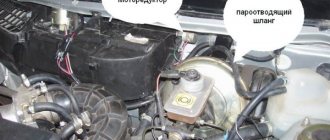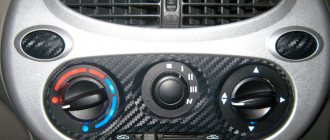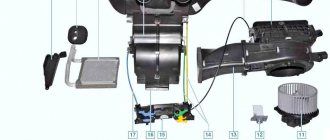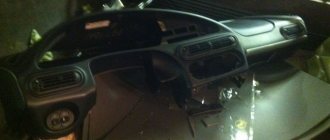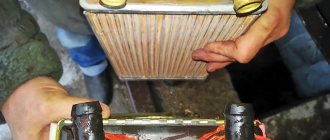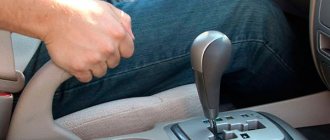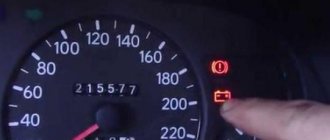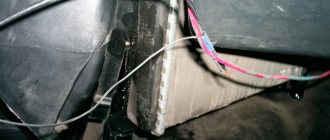Causes of odor
A strong smell of antifreeze in the cabin indicates that, most likely, coolant has leaked from the expansion tank. This situation can occur when, after prolonged use, the mechanisms of the cooling system have become unusable, or you purchased the expansion tank itself as defective, or it has become depressurized.
Antifreeze can also leak if you connect a hose incorrectly when repairing an engine or replacing a cooler.
But, due to the fact that antifreeze or antifreeze tends to evaporate, when a leak occurs in small quantities, upon inspection you may not even realize that such a problem exists
. And, naturally, when a leak occurs in a large volume, the car owner can see it by characteristic stains either on the asphalt or on the engine parts themselves.
Also, when, when you turn on the stove, the smell of antifreeze appears in the cabin and does not go away for a long time, you should not delay in finding out the causes of the malfunction, as this may lead to unpleasant consequences.
Why does the smell of antifreeze appear in the cabin?
Sometimes an unpleasant odor appears even with normal sensor readings. Ventilating the interior gives a temporary result - when the window glass is lifted, the problem manifests itself again. To completely solve it, you will have to establish its source.
Typically, the cause of the odor is an antifreeze leak. The cooling system mechanisms fail as a result of prolonged use. The expansion tank itself could be depressurized or initially be of poor quality.
An antifreeze leak sometimes appears after an engine repair - if one of the hoses was connected incorrectly. Leaks can be quite difficult to detect. The fact is that antifreeze actively evaporates, and with a minor leak, the inspection may not yield results. But if the leak is quite severe, it can be easily detected by characteristic spots on the parts of the power unit. In this case, traces of coolant are also visible on the asphalt while the car is parked.
To ensure a high-quality connection of the cooling system hoses, use special metal clamps. They are reliable and can be used for a long time. Check the radiator. If it becomes depressurized, it is better to replace it, since it is difficult to repair the device.
Consequences of odor
If the interior smells of antifreeze, this will lead, first of all, to overheating of the car engine and leakage of antifreeze from the cooling system. Secondly, inhalation of fumes negatively affects the health of both the driver and passengers.
. The amount of harmful fumes will increase many times if you turn on the stove to heat the interior, so in winter it is necessary to eliminate the malfunction as quickly as possible.
If you cannot fix the problem yourself, then contact a professional service station.
Replacing antifreeze
If the interior smells strongly of antifreeze, this can mean one thing - the antifreeze has expired and needs to be replaced. If this does not help, then there are two possible options - either the cooling system is significantly damaged, or you have bad antifreeze.
The best way to improve its properties is to dilute it with water. This will bring him many advantages: firstly, the boiling point increases and the freezing point decreases, which leads to less chance of engine wear, and secondly, the smell of antifreeze will not spread throughout the cabin.
It is worth pouring antifreeze diluted with water into the coolant in a ratio of 3:1, or vice versa, it all depends on its brand and its properties.
If everything worked out for you, then you should proceed to the next step - removing the existing odor. In fact, it's quite difficult. Thorough dry cleaning of all carpets, seats and other parts may lead to nothing, and the smell will very soon return again.
Solving the problem of odor in the cabin
Actions that need to be taken to get rid of unpleasant odor in the car interior:
- Open the hood of the car and inspect all hoses, pipes and covers for cracks and chips.
- Check the tightness of all components and parts through which antifreeze may leak.
- Inspect all lids for the presence of various new growths. Also inspect the bottom of the car to make sure there are no antifreeze leaks.
- If the vapors do not disappear for a long time, then you should inspect the system responsible for heating the car cabin.
In order to avoid problems with antifreeze vapor leaking into the cabin in the future, it is necessary, first of all, to periodically check the coolant level in the radiator. If the amount of antifreeze becomes less than the required amount, then add it to the required level or carry out a complete replacement. Carry out general vehicle diagnostics as often as possible
and correct any problems immediately.
Try to use antifreeze of the class recommended for use in the technical specifications for the car, and do not mix coolers from different manufacturers.
← Previous material
Next material →
Ozonation of the interior
Ozonation will help you. Your car receives a dosed amount of ozone into the interior using a high-voltage charge. It occupies volume evenly and stays in the cabin for some time, after which it immediately dissipates.
A smell will remain for several days after ozonation, but it will quickly disappear and will not harm you, since its concentration will be several times lower than the permissible norm.
Ozonation can also be used for simple “refreshing the interior” due to its beneficial properties to penetrate everywhere and effectively remove microorganisms throughout the entire interior.
Good luck getting rid of unpleasant odors!
Removing the smell of antifreeze from the interior
First you need to dry the wet areas. Absorbent mats are great for this purpose.
The presence of antifreeze under the driver's mat is considered one of the common causes of the “odor.” Liquid leaks from cracks in pipes are subject to evaporation, causing a specific “aroma”. These mechanical problems can be eliminated by replacing all inlet and outlet pipes.
The antifreeze collection diaper showed itself to be excellent!
The smell is eliminated by dry cleaning, ozonation, deodorization and long-term ventilation of the interior.
Replacing the cooling radiator
We inspect for leaks.
The smell is caused by an old, faulty (not removed) heater radiator, where some antifreeze remains. As the liquid evaporates, it inevitably becomes a scourge of the cabin air. Eliminating this begins with disassembling the unit and eliminating defects.
The reason for replacing the heater radiator is the presence of cracks, breakages of the side tanks, tubes, often aluminum.
The leakage of odor from the engine section, caused by leaking pipes when the engine is warm, allows antifreeze vapors to enter the passenger compartment. It can be eliminated by inspecting the cooling system and eliminating defects.
Where did the smell of antifreeze come from in the interior of the Niva Chevrolet?
Antifreeze is leaking through the hose between the block and the upper heater pipe under the hood. In this case, the smell of antifreeze will only be felt when the stove is turned on.
A manifestation of this is the broken seal of the heater radiator, its hoses and clamps. The location of the leak can be determined by visual diagnostics, which reveals mechanical defects in pipes, connections, and tightness of hose fastenings.
A sweet taste in the mouth is the first sign of an antifreeze leak.
This is evidenced by the engine temperature sensor going off scale. As a result, the coolant boils, coming out of places with weak connections. The situation becomes more complicated with the appearance of a smell when the stove is running, which does not exclude the fact that the heater radiator is faulty (leaky).
Antifreeze leaking from under the receiver gasket.
Prolonged use of the car renders rubber gaskets, cuffs, and other non-metallic components unusable . They need to be replaced urgently , and secured with reliable metal clamps.
The cause of the smell is also considered to be the expiration date of the antifreeze. Over time, the liquid ages and loses its frost resistance under the influence of environmental pressure and temperature changes. Effective cooling of the engine, preventing its boiling, and preventing corrosion remains the main function of the liquid. A temporary improvement in the properties of antifreeze is considered to be the effect of diluting it in a ratio of 3:1, but this depends on the properties of the product.
Malfunctions and symptoms
A serious problem is the leakage of antifreeze into the engine sump .
A malfunction of this kind is accompanied by the appearance of a white coating on the oil tank cap. The leakage of antifreeze leaves a puddle under the car.
Lada Priora (2013+). The smell of antifreeze in the cabin
Leak from expansion tank
As a rule, the cabin smells of coolant if it leaks from the expansion tank. In most cases, this malfunction is caused by long-term operation of the vehicle or a violation of the technical condition of the car. But, no matter how surprising it may be, antifreeze leaks often occur on modern cars. The main reason for antifreeze leakage is wear of system components or manufacturing defects. Also, working fluid may leak if pipes or other components of the cooling system are incorrectly replaced. Since the coolant tends to erode, the car owner may not notice a slight leak of the mixture. In this case, a malfunction of the car’s cooling system will be indicated by a foreign smell in the cabin. Visually, it is easier for the vehicle owner to detect a significant leak. In this case, the liquid leaves noticeable stains on the system components. If antifreeze or antifreeze quickly leaves the expansion tank, this can be determined by the readings of the corresponding analyzers or when characteristic leaks appear. When the fluid leaves the system to a small extent, you can feel a sweetish smell in the vehicle interior. In this case, it is necessary to promptly begin diagnosing the vehicle’s cooling system.
The heater or radiator is leaking
Often the reason is that the stove or its radiator is leaking. Since it has a complex design, it is recommended to replace it with a new one rather than make repairs. Leakage can also occur due to loose connections between the pipes. If it is not possible to change the heater radiator, then you can continue driving as is, but you should check the fluid level in the cooling system more often.
Diagnostics
First of all, it is necessary to conduct a visual diagnosis of the cooling system. During diagnostics, it is necessary to carefully check all conductors of the system for mechanical damage or leaks. If damaged conductors were found during the inspection, it is necessary to restore the tightness of the cooling system by replacing them.
Also, one of the most common malfunctions of the cooling system is coolant leakage into the engine crankcase. This malfunction can lead to quite serious consequences and significantly disrupt the function of the engine. This malfunction can be identified by visually inspecting the oil tank cap. If coolant enters the crankcase, a white emulsion appears on the cover. If coolant leaks out, you may notice a formation under the car.
If the inside of the car smells like antifreeze, then coolant leaks directly into the interior. The smell of antifreeze in the cabin indicates a leak in the heater core. If the radiator leaks, some of the coolant leaks directly into the passenger compartment and the driver of the vehicle may notice a characteristic sweet smell. Also, coolant can get under the gas distribution mechanism drive. In this case, it is quite difficult to visually determine the leak, but by diagnosing the space under the timing belt, you can notice characteristic traces of moisture. As a rule, the cause of moisture formation under the timing belt is a faulty pump.
As you know, the combination of maintaining temperature conditions plays an important role in the proper and long-term functioning of the engine. If the cooling system malfunctions, the engine is subject to overheating and premature wear of the components. During vehicle operation, the cooling system operates in difficult conditions. System components are constantly exposed to high pressure and temperature changes. In this regard, the elements of the cooling system are subject to increased wear and require timely diagnostics and regular maintenance.
The smell of antifreeze in the cabin indicates a malfunction of the connecting hoses of the systems and the need for diagnostics. With prolonged use of the vehicle, the rubber components of the system wear out and often become unusable. If diagnostics have shown the maximum permissible wear of the system conductors, they must be replaced. To secure the cooling system hoses, it is best to use special metal clamps, which are characterized by a long service life, reliability and do not allow leakage of the working mixture. In addition, it is necessary to pay attention to the condition of the radiator and, if necessary, restore its tightness or replace it. If there is a coolant leak, the car engine is subject to increased wear. In this regard, if you do not pay attention to the condition of the cooling system in a timely manner, you can end up with a large number of engine repair costs. Timely diagnostics and regular maintenance of the cooling part will allow you to remain confident in the reliability of the engine and increase the service life of its elements.
Danger to the body
You also need to remember that antifreeze is harmful to the body and toxic, and therefore, with a high concentration of vapors in the cabin, you can lose consciousness and create an emergency situation on the road. To prevent this from happening, it is recommended to eliminate all antifreeze leaks and stop using such a car unless absolutely necessary.
content .. 97 98 99 100 ..
What should a car enthusiast do?
First of all, carry out a complete diagnosis of the car's cooling system. This can be done in the garage, without complex devices and without special knowledge and skills. But you need to carefully remove the smell of antifreeze. Open the hood, check the pipes, hoses and covers for visible damage. Absolutely all system conductors must be checked. We replace damaged parts.
Another cause of a leak may be a malfunction in the engine crankcase. Failure leads to disruption of the functionality of the power unit. To diagnose, just look at the oil tank cap from the inside. If coolant gets on the engine crankcase, a white coating forms on the cover.
As a result of the leak, coolant can penetrate directly into the passenger compartment. This indicates a malfunction of the radiator. If a leak forms in it, some of the coolant penetrates into the cabin, where a characteristic sweetish smell is felt. We replace the radiator with a new one and remove the liquid. This can be done by placing newspapers on the puddle, which we throw away as they become soaked. Someone uses a plastic bottle. We make a hole in its lid, then squeeze the bottle to release air from it and apply the hole to the spilled moisture. In 3-4 passes, you can “suck out” the entire puddle in this way, and wipe off the remaining moisture with a rag.
The cause of the leak can be difficult to determine. If the source of suspicious traces cannot be identified, look at the radiator of the heating system. Coolant may also leak from the heater. Then an unpleasant burning smell is felt in the cabin. Leaking liquid will get under the mat. To fix the problem, you will have to replace the stove radiator by first disassembling its body.
The reason may not be in the radiator itself, but in the tubes connected to it. The joints can be treated with sealant. But it is better to immediately replace the problematic tubes with new ones.
To prevent the appearance of coolant vapors in the cabin, you need to check the level in the radiator from time to time. The evaporated liquid should be replenished, and if the evaporation is too intense, the cause of the problem should be urgently determined.
On thematic forums, it is advised to use the coolant of the brand that is recommended for use in your specific car model. It is not recommended to mix coolers of different types. Timely diagnostics of the cooling system will allow you to identify faults and increase the service life of the power unit elements.
Reasons for the smell of antifreeze in the cabin
The sweetish smell of antifreeze in the cabin, especially noticeable after turning on the heater, always indicates one thing: there is a coolant leak in the system. There are four main ways antifreeze vapor can enter the cabin.
- Through a leaky heater core. This is the most common reason. If the smell is pronounced and is accompanied by leaks of antifreeze into the interior or systemic fogging of the car windows from the inside, then most likely the heater radiator is leaking. For example, on VAZ 2114 cars (and all models of the 10 series), as well as in the first generation Kalina, the heater radiator is made of two plastic reservoirs connected to aluminum honeycombs with fins. Leaks usually occur at the junction of plastic and metal. On more recent VAZ cars, such as Granta, Priora and Kalina-2, the heater radiator is all-aluminum. It usually destroys the honeycombs or breaks the supply pipes.
